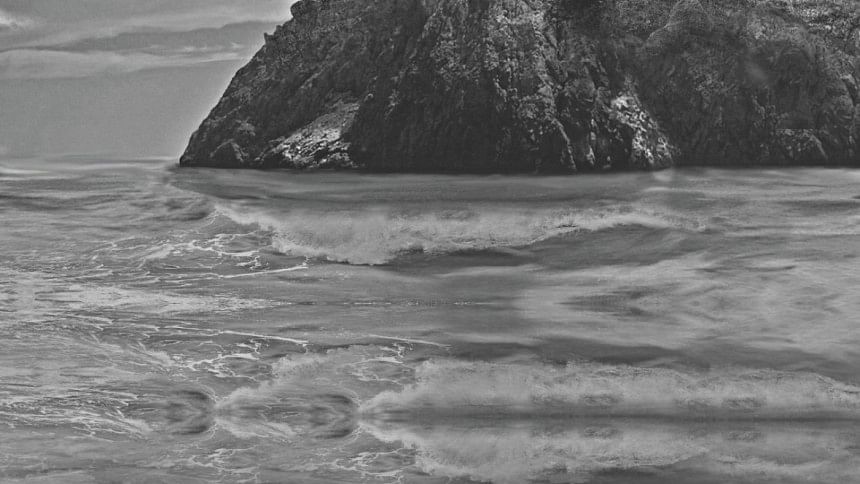The Plastic Whale

Swimming in water bodies abloom with plastic was very common for Subhash and his father. They depended on any salvage they could find from the plastic controlled territories on the island they lived in. The plastic materials were everywhere—in the ponds, in the forests, on the roads, on the puddles, in places where they shouldn't be. It was as though they were manmade creatures walking all over the earth and ultimately settling where they find it comfortable to create a colony of their own. They came in various shapes and sizes. Though diverse, they all existed for the same purpose.
The island buzzed with tourists year round. It had never been quiet. It welcomed the tourists with its mountain heads and palm-tree hands. They thanked the island, only in words, but not in action. All the while, the island choked on plastics. They littered its veins. They made their way to the island's windpipe. But the island still lived. News outlets would rush there for media coverage, shedding light on how the island was being harmed. And that would be it. The same thing would happen again. The flurry of tourists visiting and leaving, the dumping of wastes, the complaining, and the ineffectiveness of many proposals to stop pollution would exist as well.
A week ago, Subhash was photographed as he swam in a polluted pond in search of salvage. His father was standing beside the pond, supervising him. Then the news people came. They interviewed him about how his life along with many others' depended on scavenging. The landscape made its way into their videotapes. It started with the serene island mountains smothered in clouds, shy to show their peaks. Then a mob of birds flew by. The palm trees were captured too. And in the end, the pond floated into the scene. It had plastic and tin to greet the eyes. They almost gave it a solid surface. The water was like tar. The sun reflected off it. Everything did. It was as though it had birthed a reflective world, where nothing was real. Subhash was also captured in the pond, in the separate section where water lilies usually bloom, but in this case it was water bottles, some blue, and some red. The news people left. Subhash's father was disappointed since he couldn't find anything worthy. In the grand scheme of things, they always neglected the health hazards that came with swimming in dangerous waters. It would be only foolish of them to speak of health hazards with nothing in their stomach.
"I don't feel too well," Subhash said like he did a month ago. His father, like usual, brushed off the concern with his regular reply, "Don't worry, you will be fine in a day." Though they weren't affected with any illnesses until then, the bad things were always taking shape, preparing to appear in a way that everyone would remember.
The night fell all over the island. The circular yellow moon floated up in the sky, like a jaundice patient's eye. A smooth breeze blew as usual. No one knew it called for a storm though. Subhash got severely weak that night. "Fever," his father said. The temperature rose and calmed, but it never went away. It was pretty normal though, as it was not the first time. Father dabbed a wet cloth on his forehead, praying for fast recovery. Outside, it started raining heavily. He would have gone out to buy medicine, but the rain was cruel. It pelted hails. A brick shaped hail fell, and then a pebble shaped one. Either way, it was very risky to go outside since they fell in herds.
The thunder strikes kept everyone awake. Whenever they struck, a lilac morning appeared, and after a second, it went away. The trees were dancing sideways in the strong wind. Some were uprooted and flew into ponds. Some crashed into huts, claiming lives. The sea was grumbling. It was tough to distinguish the sounds of the sea and lightning. The night didn't calm down. Neither did it look like it would soon. Some fell asleep. Some stayed awake. Some died in their sleep. Some died while they were awake.
Though the night left eventually and the sun showed up, its terrors were scattered all over the island, motionless, with their eyes pointed to the sky. The impact lived on, even in their absence. They lived in the eyes of those who lost their close ones. They lived in trees that were uprooted. They lived in the ocean that claimed many lives by stretching its hands longer than it should have.
Subhash had died that night. The next morning, a whale washed up in the isolated beach, which was just a minute's walk from their hut. His father went to the adjacent forest to bury him. After the burial, the scene greeted his father's blurry, mournful eyes. Plastic bags and bottles covered the surface of the whale's dark skin. They stretched all over its body like dead jellyfish. It had plastic eyes and a plastic tail. An avalanche of tin cans and plastic materials were falling out of its mouth, fully covering the tongue and teeth. Unwanted things were hanging off its body— designer clothes, polythene bags, cans, one time use mugs. It was as though someone had made a plastic whale for a school project, or an art piece for an exhibition.
Subhash's father approached the dead whale for some decent salvage. He knew he'd find some. So before the news people came to print the whale on papers, he simultaneously had two things to do, the scavenging and the mourning. He needed a hand to do all the work, but Subhash wasn't there.

 For all latest news, follow The Daily Star's Google News channel.
For all latest news, follow The Daily Star's Google News channel. 



Comments